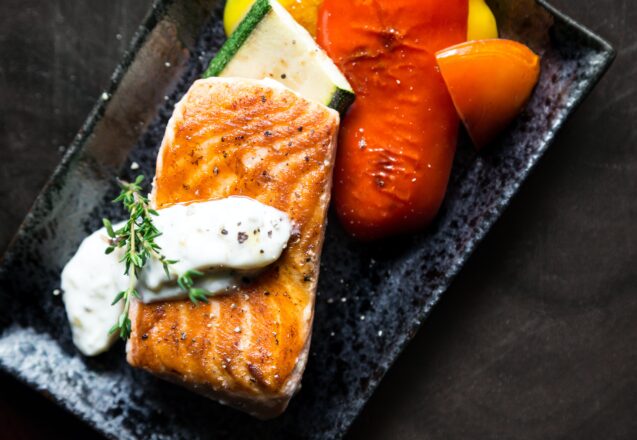Best Foods For Your Heart
 At Revolution Training in Stamford, CT, we emphasize exercise to help get you into shape, but also include nutritional information. If you don’t have the proper building blocks of material, no matter how often you workout or how hard, you won’t get fitter. Many of our clients come for training to help improve serious conditions, such as diabetes or heart disease. For these conditions, diet is extremely important. While eating healthy is good for both condition, there are specific diets can help improve your condition. Foods for your heart are high in Omega-3 fatty acids, vitamin D, CoQ10, magnesium and potassium. Shedding extra weight can also help a heart condition.
At Revolution Training in Stamford, CT, we emphasize exercise to help get you into shape, but also include nutritional information. If you don’t have the proper building blocks of material, no matter how often you workout or how hard, you won’t get fitter. Many of our clients come for training to help improve serious conditions, such as diabetes or heart disease. For these conditions, diet is extremely important. While eating healthy is good for both condition, there are specific diets can help improve your condition. Foods for your heart are high in Omega-3 fatty acids, vitamin D, CoQ10, magnesium and potassium. Shedding extra weight can also help a heart condition.
Get vitamin D for overall good health, including heart health.
For too long, people cherished a deep tan and spent days in the sun, slathering on baby oil to make the effect more intense. Only later did they find it opened the doorway to potential skin cancer and early aging of the skin. Now we’re on the other spectrum, where sunscreen is in every product and people don’t get enough sun. The body changes the rays of the sun into vitamin D. There are studies that show a vast majority of Americans have a vitamin D shortage. While it’s harder to get vitamin D from food, you can eat egg yolks, cheese, beef liver and vitamin D fortified products to boost your intake.
Eat more omega-3 fatty acids and fewer omega-6 fatty acids.
You do need both, omega-3 and omega-6, but there’s a perfect balance that you should strive to achieve. The ideal ratio is four units of omega-6 to one unit of omega-3. Today the average diet is 25 parts of omega-6 to one part omega-3. Omega-3 is good for anxiety and can help lift depression. It is good for eyesight, reduces the risk of heart disease, is anti-inflammatory, reduces the risk of diabetes, reduces the symptoms of ADHD, may help prevent cancer, improves bone health and can be helpful to prevent mental decline that occurs with age. Sources of Omega 3 are fatty fish such as fatty fish like herring, salmon and tuna, shrimp or flaxseeds and other seeds and nuts, particularly macadamia nuts.
Magnesium can help keep blood pressure lower.
If you lack magnesium, it could be the cause of your high blood pressure. Not only does a lack of magnesium cause an increase in blood pressure, it could also cause muscle cramps. Since the heart is a muscle, getting adequate magnesium is extremely important. Lack of magnesium is also related to mental disorders, irregular heartbeat, asthma and osteoporosis. What contains magnesium? Soybeans, raw spinach, avocados and dark chocolate are a few. If you soak your feet in Epsom’s salt, magnesium sulfate, it can ease muscle and joint pain.
- Dietary fiber helps lower blood cholesterol levels, which helps prevent heart disease. It also helps you lose weight, which can also help promote heart health. Fresh fruit and vegetables provide fiber, as does whole grains.
- Look to green veggies like broccoli, asparagus, Brussels sprouts and lentils for extra folic acid, vitamin B-9. It reduces homocysteine, which is an indicator that you lack nutrients and a precursor for heart attack and stroke. Having adequate folic acid can reduce the risk of stroke and heart disease by 20%.
- If you lack CoQ10, you might have high blood pressure. Low levels of CoQ10 are also linked to heart failure. Eating red meat, sea food, nuts and seeds, soy chicken and organ meats can increase CoQ10 levels.
- Make your plate a rainbow. The more colorful your plate, the more likely you’ll have all the nutrients and phytonutrients your heart requires. Each color contains different amounts of specific heart healthy nutrition.
For more information, contact us today at Revolution Training



 We provide nutritional information at Revolution Fitness, because you need both a program of exercise and a nutritious diet to have a healthy lifestyle. While everyone seems to agree on whether greens and veggies are good for your health, there’s a lot of controversy over whether dairy is. One problem is digestive issues, which leads to the question whether dairy is good for your gut. A healthy microbiome, the bacteria of the gut, is important to your overall health.
We provide nutritional information at Revolution Fitness, because you need both a program of exercise and a nutritious diet to have a healthy lifestyle. While everyone seems to agree on whether greens and veggies are good for your health, there’s a lot of controversy over whether dairy is. One problem is digestive issues, which leads to the question whether dairy is good for your gut. A healthy microbiome, the bacteria of the gut, is important to your overall health.
 We’re bombarded by advertising information that isn’t always completely true, so it can make you wonder whether all the hype about organic food is legitimate or just another reason to charge more money. Exactly what does organic mean? If you’re talking about vegetables and fruits, grown with no pesticides, synthetic fertilizers, sewage sludge, genetically modifications or ionizing radiation. Animals raised organically take no antibiotics or growth hormones and are often free-range, meaning they aren’t kept in a cage and allowed to graze on grass or in the case of chickens, eat bugs and other natural foods.
We’re bombarded by advertising information that isn’t always completely true, so it can make you wonder whether all the hype about organic food is legitimate or just another reason to charge more money. Exactly what does organic mean? If you’re talking about vegetables and fruits, grown with no pesticides, synthetic fertilizers, sewage sludge, genetically modifications or ionizing radiation. Animals raised organically take no antibiotics or growth hormones and are often free-range, meaning they aren’t kept in a cage and allowed to graze on grass or in the case of chickens, eat bugs and other natural foods.
 You may overlook the importance of fiber in your diet and think it’s only for people that have problems going to the bathroom, but that’s simply not true. In fact, at Revolution Training in Stamford, CT, we believe that what you eat is just as important as exercise. That food should contain adequate fiber, not just to help you go, but to stay healthier. There are two types of fiber and getting adequate amounts of both is important to your overall health.
You may overlook the importance of fiber in your diet and think it’s only for people that have problems going to the bathroom, but that’s simply not true. In fact, at Revolution Training in Stamford, CT, we believe that what you eat is just as important as exercise. That food should contain adequate fiber, not just to help you go, but to stay healthier. There are two types of fiber and getting adequate amounts of both is important to your overall health.
 Are you looking for workouts for beginners? It can be confusing. There are so many things to consider, such as making certain your workouts have cardio, strength, flexibility and balance training. Knowing where to start, what to do and how many repetitions of each. Knowing how many repetitions to do and how many sets can only be determined by your level of fitness. There are some key concepts to remember, then you can choose exercises that suit your needs.
Are you looking for workouts for beginners? It can be confusing. There are so many things to consider, such as making certain your workouts have cardio, strength, flexibility and balance training. Knowing where to start, what to do and how many repetitions of each. Knowing how many repetitions to do and how many sets can only be determined by your level of fitness. There are some key concepts to remember, then you can choose exercises that suit your needs.
 At Revolution Training in Stamford, CT, I urge clients to adopt a healthier way of eating. That means to give up highly processed food, especially sugar, since it’s incredibly bad for all parts of the body. Eating a lot of sugar also makes losing weight nearly impossible, plus it affects your organs and is highly addictive. Sugar assaults the body today more than ever, since it’s in just about everything you eat, from ketchup to yogurt. Even worse than the inclusion of natural sugar, today’s products have an artificially created type. It’s called high fructose corn syrup—HFCS—which create even more health problems.
At Revolution Training in Stamford, CT, I urge clients to adopt a healthier way of eating. That means to give up highly processed food, especially sugar, since it’s incredibly bad for all parts of the body. Eating a lot of sugar also makes losing weight nearly impossible, plus it affects your organs and is highly addictive. Sugar assaults the body today more than ever, since it’s in just about everything you eat, from ketchup to yogurt. Even worse than the inclusion of natural sugar, today’s products have an artificially created type. It’s called high fructose corn syrup—HFCS—which create even more health problems.
 If you’ve never tried a workout with a punching bag, you need to come to Revolution Training in Stamford, CT, and you’ll see how effective they are. Not only are they great as a full body workout, it can be a lot of fun to do. It can break the monotony of traditional exercise, plus work your whole body at the same time. The first time you hit a punching bag, you’ll be surprised at how much resistance you’ll meet. It can jar your whole body the first time.
If you’ve never tried a workout with a punching bag, you need to come to Revolution Training in Stamford, CT, and you’ll see how effective they are. Not only are they great as a full body workout, it can be a lot of fun to do. It can break the monotony of traditional exercise, plus work your whole body at the same time. The first time you hit a punching bag, you’ll be surprised at how much resistance you’ll meet. It can jar your whole body the first time.
 If you’ve heard of circuit training, you might have thought it was the same as superset workouts. They’re similar, but not quite the same. When you do circuit training, you’re doing several different exercises, one after another, with a minimum amount of rest between each type exercise. With supersets, you’ll perform just two exercises, normally these are strength training exercises, one right after another.
If you’ve heard of circuit training, you might have thought it was the same as superset workouts. They’re similar, but not quite the same. When you do circuit training, you’re doing several different exercises, one after another, with a minimum amount of rest between each type exercise. With supersets, you’ll perform just two exercises, normally these are strength training exercises, one right after another.
 There’s a lot of new types of equipment in many gyms, often taking attention away from tried and true methods for fitness, such as jumping rope. One of those undervalued pieces of equipment is the medicine ball. It’s been around for centuries. In fact, some believe that Hippocrates, the father of medicine, created it when he recommended a form of ball games to help patients get healthier. It was used by Athenians as part of their athletic training, too. Just like kettlebells, it has a long history.
There’s a lot of new types of equipment in many gyms, often taking attention away from tried and true methods for fitness, such as jumping rope. One of those undervalued pieces of equipment is the medicine ball. It’s been around for centuries. In fact, some believe that Hippocrates, the father of medicine, created it when he recommended a form of ball games to help patients get healthier. It was used by Athenians as part of their athletic training, too. Just like kettlebells, it has a long history.
